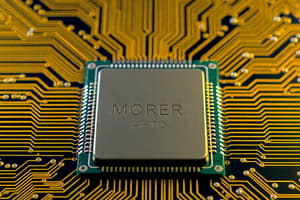Podcast
Questions and Answers
What is the main function of the CPU in a computer?
What is the main function of the CPU in a computer?
- Perform calculations and logic operations (correct)
- Store data permanently
- Control external devices
- Manage network connections
Which type of memory is volatile and loses its contents when power is turned off?
Which type of memory is volatile and loses its contents when power is turned off?
- Magnetic Disk Storage
- Random Access Memory (RAM) (correct)
- Read-Only Memory (ROM)
- Flash Memory
What is an Operating System primarily responsible for?
What is an Operating System primarily responsible for?
- Providing a user interface exclusively
- Managing hardware and software resources (correct)
- Running applications separately
- Storing all user data securely
Which of the following is NOT a programming language?
Which of the following is NOT a programming language?
What does 'bandwidth' refer to in networking?
What does 'bandwidth' refer to in networking?
Flashcards are hidden until you start studying
Study Notes
Central Processing Unit (CPU)
- The CPU is the primary component responsible for executing instructions in a computer.
- It performs calculations, runs programs, and coordinates activities of other hardware components.
- Often referred to as the "brain" of the computer due to its crucial role in processing data.
Types of Memory
- Volatile memory loses all stored data when power is turned off; examples include RAM (Random Access Memory).
- Non-volatile memory retains information after power is lost, such as ROM (Read-Only Memory) and solid-state drives (SSDs).
Operating System (OS)
- An OS serves as the intermediary between hardware and user applications.
- It manages system resources, including CPU, memory, and storage.
- Provides services like file management, task scheduling, and device control.
Programming Languages
- A programming language is a formal set of instructions used to produce various types of outputs.
- Examples include Python, Java, and C++.
- Items not classified as programming languages would vary; common examples might be HTML or CSS.
Bandwidth in Networking
- Bandwidth refers to the maximum rate of data transfer across a network connection.
- It is measured in bits per second (bps), affecting how quickly data can be sent or received.
- A higher bandwidth allows for faster internet speeds and improved performance for applications requiring substantial data transfer.
Studying That Suits You
Use AI to generate personalized quizzes and flashcards to suit your learning preferences.




